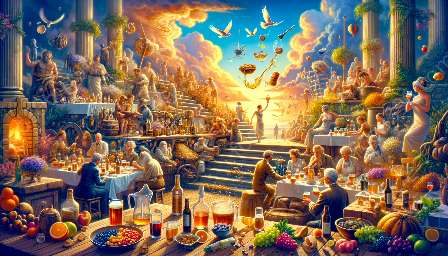Beverages have played a central role in human civilization, with their consumption tracing back to ancient times. From alcoholic concoctions to non-alcoholic beverages, the history of beverages is a rich tapestry woven with cultural, social, and economic significance.
History of Beverages
The history of beverages is a testament to the human desire for enjoyment, refreshment, and socialization. The earliest fermented beverages, such as mead and beer, have been traced back to ancient civilizations like the Sumerians and Egyptians. These early forms of alcoholic drinks were often brewed for ritualistic, medicinal, and social purposes.
As civilizations evolved, so did the variety of beverages. The Silk Road facilitated the exchange of teas and spices, leading to the creation of rich and diverse beverage cultures across the world. The industrial revolution further transformed the beverage industry, with the mass production and commercialization of beverages.
Prohibition and Its Impact
The era of prohibition, particularly the Prohibition in the United States from 1920 to 1933, stands out as a pivotal period in the history of beverages. The ban on the production, sale, and transportation of alcoholic beverages had far-reaching implications for the industry and society at large.
Prohibition led to the rise of speakeasies, illegal alcohol production, and the notorious gangster culture. The illegalization of alcohol also drove the creation of alternative beverages, including non-alcoholic cocktails, sodas, and fruit juices. These innovations laid the foundation for the non-alcoholic segment of the beverage industry, which continues to thrive today.
Effects of Alcohol Prohibition
The effects of alcohol prohibition reverberated across society, economics, and culture. The ban on alcoholic beverages deeply impacted the economic livelihood of brewers, distillers, and distributors, leading to widespread job losses and economic hardship.
Cultural and social norms also underwent significant shifts during prohibition. The clandestine nature of speakeasies and the rise of illegal alcohol trade gave rise to a new subculture that challenged traditional social norms. Additionally, the wave of organized crime spurred by prohibition had lasting repercussions on law enforcement and the criminal justice system.
Rise of Alternative Beverages
In response to prohibition, the beverage industry saw the emergence of a variety of alternative drinks. Non-alcoholic beverages, including mocktails, sodas, and flavored syrups, gained popularity as substitutes for traditional alcoholic drinks. This period marked the beginning of the diversification of the beverage market, as producers sought to cater to the changing consumer preferences.
Additionally, the rise of non-alcoholic beverages paved the way for innovations in mixology, leading to the creation of sophisticated and flavorful mocktails that continue to be enjoyed by patrons seeking alcohol-free options.
Legacy and Beverage Studies
The impact of prohibition on the beverage industry has left a lasting legacy that continues to influence beverage studies. Scholars and researchers examine the lessons learned from prohibition and its enduring effects on the production, marketing, and consumption of beverages. The shift towards non-alcoholic alternatives, the rise of mixology as a craft, and the changing patterns of beverage consumption are all areas of study within the broader field of beverage studies.
Understanding the historical context and the repercussions of prohibition is essential for comprehending the complexities of the contemporary beverage industry. It sheds light on consumer preferences, regulatory frameworks, and the dynamic interplay between culture and commerce in the realm of beverages.

